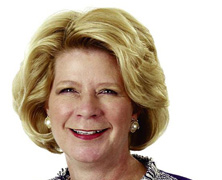I believe that mentoring is an extension of good leadership because it’s a form of feedback. Today, I advocate it, practice it and reward it in others.
When I began working, however, I didn’t know there were mentors or how helpful they could be. Fortunately, I had people I thought of as fans who expressed interest in my career.
One of my early fans gave me my first job in banking. He was a little skeptical at first. I didn’t have an MBA at that time, and women were scarce in banking. But by offering me the position, he gave me an opportunity to succeed. And when I did, he not only was highly supportive, but he also became one of my biggest fans.
Another fan was a bank president who put me in charge of crucial client relationships that traditionally were managed by men. His action prompted calls from worried clients: “Do you not want my business any more? Why are you sending a woman to handle my accounts?” But he stuck by me, saying he wouldn’t have sent me if he hadn’t thought that I could do the work. He gave me the chance to prove myself.
As these examples illustrate, mentors don’t guarantee success; they open a door. That open door may lead to a particular job or career or, even more powerful, insight on how to manage yourself.
In my experience, one of the biggest career de-railers is the inability to see yourself as others see you. So, I think it’s vital to seek out mentors who will reflect you to yourself and help you strengthen specific behaviors. This is not easy. You may hear some tough feedback, but you will build a better career if you listen carefully and accept the guidance.
If you are successful, reconnect with and thank those whose support, encouragement or advice helped you. Then share their gift. Reach out to other promising individuals and support, when and where you can, their career journey toward success.







